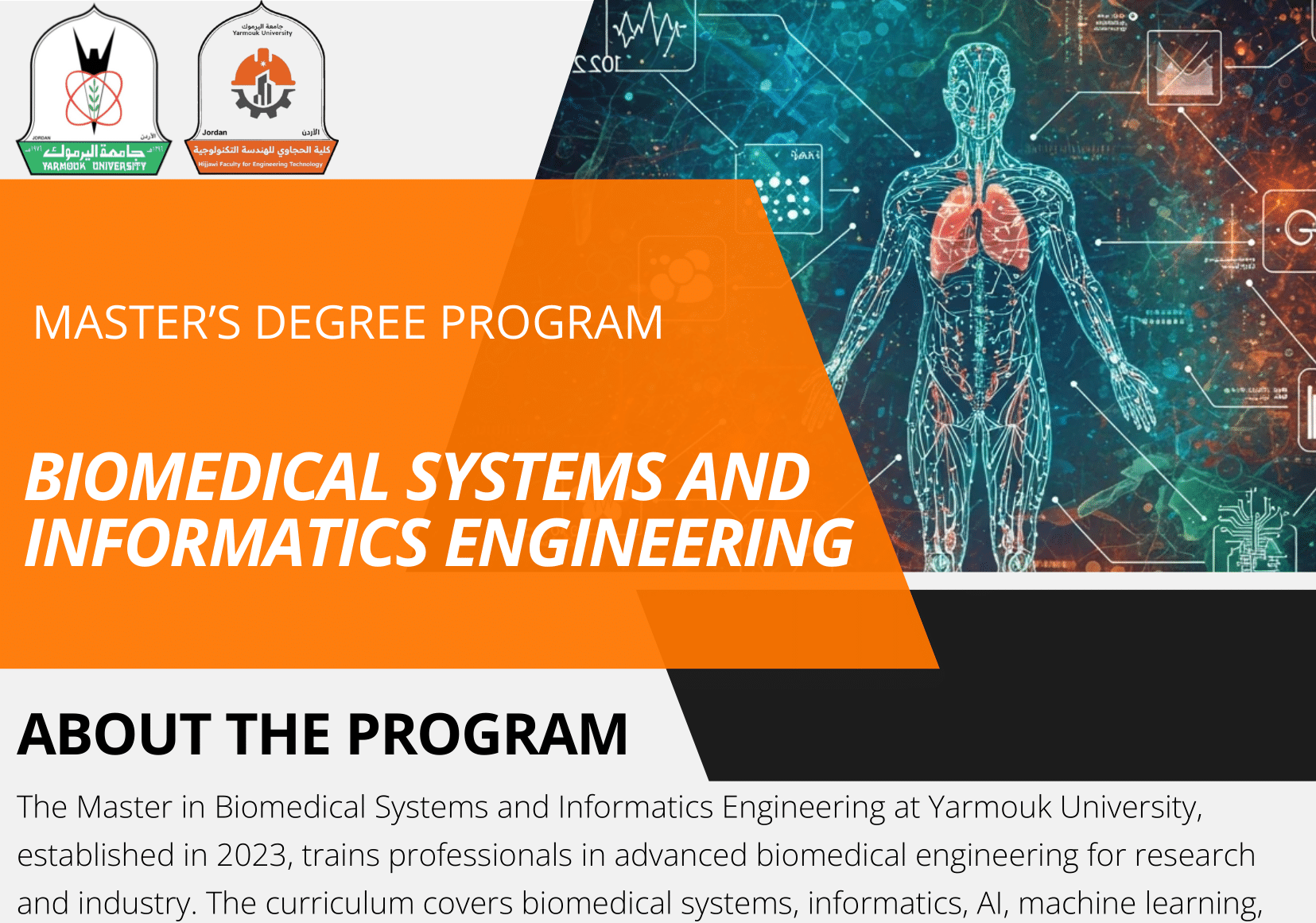Program Department and Chair
For inquiries or further information, please contact:
Email: medical.dept@yu.edu.jo
Phone: +962 2 721 1111 ext. 4551
Eng. Sami Almashaqbeh
Chair, Biomedical Systems and Informatics Engineering Department
Instructor, Biomedical Systems Engineering
sami.m@yu.edu.jo
+962 2 721 1111 ext. 4551
About the Program
The Master in Biomedical Systems and Informatics Engineering degree program at the Hijjawi Faculty for Engineering Technology, Yarmouk University, was established in 2023. It is designed to graduate professionals with advanced competencies in biomedical engineering, particularly in the industrial and research sectors. The program prepares students to conduct rigorous scientific research, develop and maintain advanced biomedical technologies, and assume ethical and professional responsibilities in diverse healthcare environments.
The curriculum integrates core knowledge in biomedical systems, informatics, and applied computational methods. Students gain expertise in hospital automation, the use of artificial intelligence and machine learning for disease modeling and treatment planning, and the design and maintenance of medical devices and prosthetics. The program fosters interdisciplinary learning, drawing from fields such as medicine, pharmacy, biology, computer science, and medical physics.
To accommodate diverse career goals, the program offers two study tracks:
-
Thesis Track – Focused on academic and industrial research, ideal for students planning to pursue a Ph.D. or engage in R&D roles.
-
Non-Thesis Track – Tailored for professionals seeking advanced technical and practical expertise through additional coursework.
This program is uniquely positioned in Jordan as the only graduate offering that combines biomedical systems with biomedical informatics. Its multidisciplinary framework allows for admission from a wide range of undergraduate backgrounds, including biomedical engineering, computer engineering, electrical and electronics engineering, chemical engineering, medical physics, pharmacy, life sciences, and computer science.
Through a combination of rigorous academic training, hands-on experience, and close alignment with current healthcare technologies, the program produces graduates equipped to contribute meaningfully to academic, clinical, and industrial advancement in the biomedical field.
across various domains of biomedical engineering, with a strong focus on the industrial sector.
to conduct rigorous scientific research, engage in lifelong learning, and pursue doctoral-level studies with competence.
to the ethical, legal, and professional standards governing the biomedical engineering field.
Study Plan
The Master in Biomedical Systems and Informatics Engineering degree program consists of 34 credit hours and is typically completed within two years. It is designed to equip students with advanced knowledge and applied skills across the interdisciplinary domains of biomedical systems, health informatics, and intelligent medical technologies.
The curriculum includes core courses covering Computational Methods in Biology and Medicine, Advanced Biomaterials, Mathematical and Statistical Applications in Biomedical Engineering, Advanced Biosignals Measurements, Biomedical Signal and Image Processing applications, Advanced biomedical Signal Processing, and Advanced Machine Learning in Biomedical Informatics. These courses provide a solid foundation in both engineering principles and informatics applications relevant to modern healthcare environments.
To support specialization, students can choose from a wide range of elective courses such as Advanced Medical Image Processing, Advanced Medical Image Processing, Medical Imaging Simulation and Modeling, Biomedical Applications of Micromachining, Embedded Systems Design, and Advanced Bioinstrumentation. This flexibility allows students to tailor their learning according to career goals in research, development, or clinical technology sectors.
The program offers two study tracks:
-
Thesis Track: Students undertake a research project under the guidance of faculty and submit a thesis. This track is suited for those planning to pursue doctoral studies or careers in research and development.
-
Non-Thesis Track: Students complete additional coursework and must pass a comprehensive examination that demonstrates their mastery of key biomedical engineering and informatics topics.
Through its interdisciplinary focus, practical orientation, and strong connection to industry and healthcare institutions, the program prepares graduates to lead innovation in medical technologies and health information systems.
Tuition Fees
- For Jordanian Students
- For International Students
Career Opportunities
Graduates of the Master in Biomedical Systems and Informatics Engineering degree program are equipped with interdisciplinary skills that enable them to work across a variety of health, technology, and research sectors. They can play key roles in integrating biomedical technologies with informatics to drive innovation in patient care, diagnostics, and healthcare systems. They are well-positioned to contribute to next-generation healthcare innovations, bridge the gap between engineering and medicine, and lead digital transformation efforts in medical environments.
-
Hospitals and healthcare institutions
-
Medical device and health technology companies
-
Biomedical research and development centers
-
Health informatics and digital health companies
-
Pharmaceutical and biotech industries
-
Academic and clinical research institutions
-
Governmental and regulatory agencies
Awesome Engineering Technology Program
Learn more about the cutting-edge Master in Biomedical Systems and Informatics Engineering degree program by exploring the materials provided here, and discover how this interdisciplinary program combines engineering, medicine, and informatics to prepare professionals for impactful roles in healthcare innovation, medical technology, and biomedical research.





